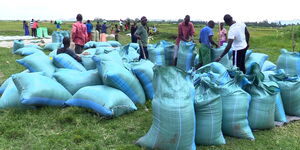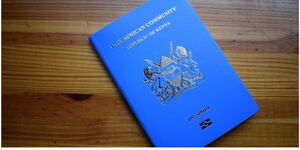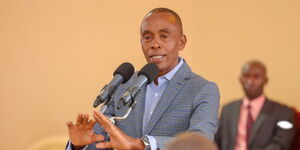Law Society of Kenya President Nelson Havi has called into question reports by the Judiciary over the number of rulings delivered over a period of one month.
Speaking to Kenyans.co.ke on Thursday, May 7, 2020, he raised questions on the logistics and truth behind claims that the Chief Justice David Maraga-led team had delivered 7,000 judgements in the said period.
"Of course the Judiciary has delivered some judgements and rulings, and these are rulings that have been outstanding for a very long time. They are not rulings in respect of matters higher. The horrendous impression created by the CJ is that they have been working and these 7,000 are the evidence, no they have not been working.
"I am the president of LSK and I can tell you for a fact the judgements are not even 3,000," Havi stated.
"There is a big problem when the Judiciary misrepresents that it has delivered 7,000 judgements in the last month. How were these judgements written without access to court files now that all registries are still closed? Where are the judgements, in the cloud? Who is fooling who?" Havi posed.
He asserted that no matter had been substantively heard through the Zoom application. He pointed out that only the LSK versus the Ministry of Interior and the Inspector General of Police on the curfew was the only petition heard on a hard matter over the Covid-19 period.
He argued that 7,000 cases would translate to a similar number of files, further questioning if the magistrates had taken the files home with them, noting of files that are up to six feet high on account of documentation.
"Three judges have called me and asked me to send them some of my papers in soft copy because they can't access the volumes that are otherwise kept in the registry," he stated.
He highlighted that the challenges brought into question the quality of the hearings because they could not access full case documents.
After the conclusion of a case, the judges are supposed to indicate to the court what they have filed, highlight the salient features that support their case, point the law that supports the case and give a conclusion, something Havi noted was not being done, and was not humanly possible to accomplish within the limited scope of the virtual rulings.
The LSK president argued that the statistics given by the CJ were exclusive of rulings in remote areas of the country. He stated that some areas lacked cellular network, noting the closure of the courts in Nyando.
CJ Maraga on Wednesday, May 6 while receiving a donation of computers from the Europan Union (EU) at the Supreme Court building, stated that the pandemic had by default required that dispensation of duties by the commission be step up.
He recognised that the Judiciary had embraced technology and cases had been determined at a much faster rate.
“The use of technology in the dispensation of justice has since proved an invaluable channel through which we can carry out operations in the justice sector during this period of scaled-down court operations,” Maraga stated.
“We have so far managed to deliver approximately 7,000 judgments during this period. There is no doubt that the crisis has provided an opportunity for us in the justice sector to reflect on how to address the current gaps related to technology in the enhancement of justice," he asserted.
This sparked an uproar from lawyers who have in the recent weeks complained of postponement of rulings, and faults in network connectivity hampering hearing sessions.












